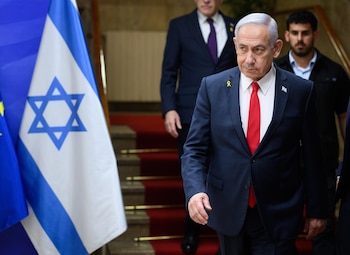
Negotiations for a ceasefire in Gaza appear to have reached an end—or at least a fever pitch—as Israeli Prime Minister Benjamin Netanyahu indicated he plans to expand military operations to occupy the entire Gaza Strip.
In a statement released by his office, Netanyahu said he would convene his security cabinet this week to “instruct the Israel Defense Forces (IDF) how to achieve the three war objectives we have set… defeat the enemy, free our hostages, and ensure that Gaza never again threatens Israel.”
An Israeli official noted that talks with the Trump administration on this decision are ongoing. “There is a growing understanding that Hamas is not interested in a deal,” said the official, one of several with knowledge of the Gaza decision-making process who spoke on condition of anonymity.
The White House did not answer questions about Israeli plans and declined to expand on comments made Saturday by Steve Witkoff, President Donald Trump's special envoy for negotiations. Witkoff told hostage families in Tel Aviv that their proposal for a temporary cease-fire and the release of about half of the 20 live Israeli hostages still being held by Hamas in Gaza"isn't working, and we've tried everything."
Trump, according to Witkoff, “now believes everyone should go home at the same time. No piecemeal deals.” He said the administration is formulating a new “all or nothing” plan. Both sides have rejected elements of Witkoff’s proposal that has been on the table.
The State Department declined to comment.

According to diplomats and hostage families briefed by US officials, it remains unclear what the administration's new approach entails or how closely it is linked to Netanyahu's new military plans.
Officials from Qatar and Egypt — countries that, along with the United States, have mediated negotiations between Israel and Hamas since almost the start of the conflict nearly two years ago — said they were not aware of any new cease-fire agreement proposed by the United States.
Although right-wing factions of Netanyahu's government have long supported a complete takeover of Gaza, senior Israeli security officials have repeatedly insisted that Israel has already achieved its military objectives of eliminating Hamas's ability to govern Gaza or launch offensives, according to Israeli media reports.
The IDF claims to control more than 75 percent of Gaza, a densely populated area of 365 square kilometers. The United Nations has said that only 12 percent of the territory remains outside Israel's militarized zones or has not been affected by evacuation orders. Most of Gaza's 2.2 million residents currently live in tent camps in the south of the enclave.
The IDF has generally refrained from operating in areas where Israeli intelligence services believe hostages are being held. The families of the hostages and many Israeli security officials have long maintained that only a negotiated settlement could bring most of the captives home.
“Netanyahu has decided to occupy the Gaza Strip, which means military operations will also be carried out in areas where there are hostages,” said a source familiar with the prime minister’s decisions who spoke on condition of anonymity because they were not authorized to speak to the media.
Freed hostages have told Israeli media in interviews that their captors had orders to kill them if they believed Israeli troops were approaching.

Einav Zangauker, whose son Matan is still being held in Gaza , wrote on X on Monday: “667 days of the hostages living through a Holocaust in the tunnels, and instead of reaching a full agreement—a workable one—to end the war, Netanyahu is preparing an operation that will turn the living hostages into corpses and make the fallen ones disappear.”
Videos released by Hamas late last week showed two visibly malnourished hostages. “You see your son dying before your eyes and you can’t do anything,” Ofir Braslavski, father of Rom Braslavski, one of the captives shown in the videos, told the Associated Press.
Some relatives who met with Witkoff in Tel Aviv over the weekend said they believe the new plan he outlined is the best chance of achieving the release of all the hostages and an end to the war.
“This administration inherited that phased approach,” which resulted in two temporary truces and the release of more than 200 hostages under Biden, “and was persuaded by the Israeli government that this was the best option to reach an agreement,” said Ruby Chen, father of Itay Chen, a 19-year-old dual US-Israeli citizen kidnapped by Hamas on October 7, 2023, during its attack on southern Israel that sparked the war.
“But this administration took six months and realized that it wasn't a plan they could execute, and they decided to change it and come up with one that has a higher probability of success,” Chen told The Washington Post.
The Israeli official said that “the prime minister is pushing for the release of the hostages while moving forward with a military resolution, combined with the delivery of humanitarian aid to areas without combat and, to the extent possible, to areas not controlled by Hamas.”
The release of the videos by Hamas of skeletal hostages came at a time of growing international outrage over images of malnourished Gazan children amid what the UN has called near-famine conditions.

Israel has restricted the delivery of humanitarian aid by international agencies, instead supporting the Gaza Humanitarian Foundation, which operates four distribution centers in the south of the enclave. Hundreds of Gazans have died while approaching IDF positions in an attempt to reach the centers, which are guarded by US security contractors.
Several Arab and European countries, joined by Canada on Monday, have airlifted food supplies to Gaza. Jordan, which has also sent aid by road, on Monday condemned what it called “deliberate obstruction” of convoys by Israeli settlers as the trucks crossed the West Bank into Gaza.
“This is not the first time such violations have occurred,” Jordanian government spokesman Mohammad al-Momani said, according to the official Jordan News Agency. In addition to settler attacks, he added, Israel has imposed tight restrictions on the number of trucks allowed to cross each day and introduced complicated approval processes, chaotic border inspections and new customs fees.
